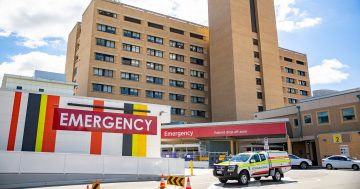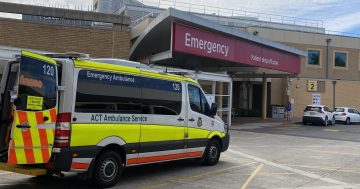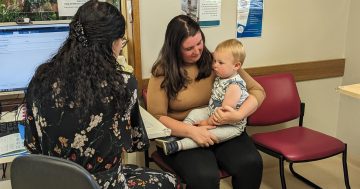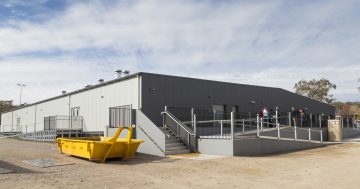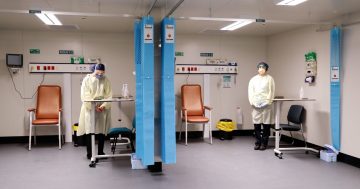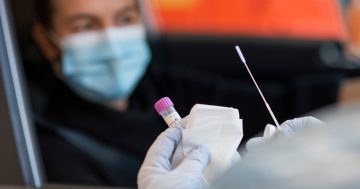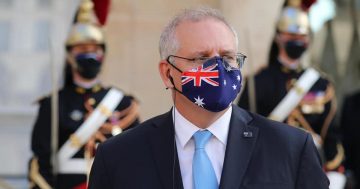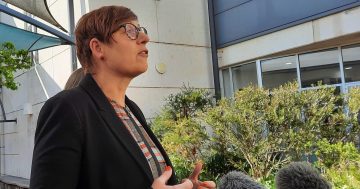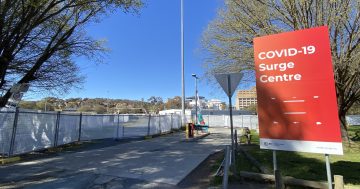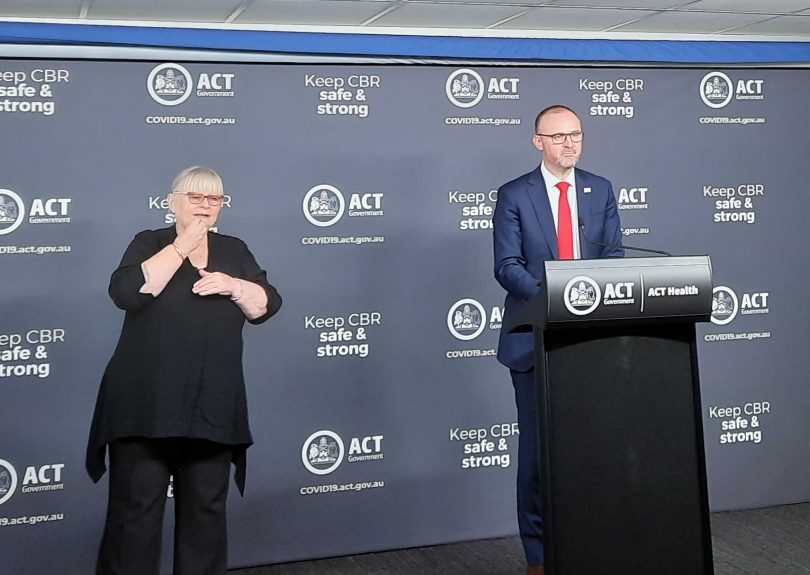
Chief Minister Andrew Barr said the government’s focus was on suppressing the virus and driving vaccination. Photo: Ian Bushnell.
UPDATED 5:00 pm: Students from one of the University of Canberra’s lodges have been contacted to inform them that a resident has tested positive for COVID-19.
Students at Cooper Lodge were notified this afternoon by Vicki Williams from the University’s Critical Incident team about the “understandably difficult situation”.
Close contacts have been identified and contact tracing is underway.
ACT Health has advised that the fourth floor of Cooper Lodge has been determined a casual contact exposure site, and the exposure period has been identified as 11 to 14 September. All residents living on the fourth floor will be required to undergo immediate testing and isolate in accordance with ACT Health casual contact procedures.
The remainder of Cooper Lodge is considered a monitor for symptoms exposure site. Any students who may have attended Cooper Lodge during this period are advised to monitor symptoms, get tested immediately with even the mildest COVID-19 symptoms and complete a University Incident Report.
UPDATED 3:30 pm: Ninety per cent of eligible Canberrans may be fully vaccinated by mid-November, according to Chief Minister Andrew Barr, but he is not about to offer any NSW-like promises or guarantees about when the public health crisis may be over.
The ACT Government has come under pressure this week about the lockdown extension to 15 October and a reluctance to promise the kinds of relief the NSW Government appears to be offering to its residents, despite daily cases above 1,000 and people dying there every day from COVID-19.
Mr Barr said the government would be able to offer more concrete details to a fretting business sector about its path out of lockdown in a couple of weeks’ time, but for now the government’s focus was on suppressing the virus and driving vaccination.
“I’m absolutely certain that if we ended lockdown today, in the space of a week, we would have hundreds and hundreds of cases, that would quickly become thousands, and hundreds and hundreds of people in hospital and hundreds of hundreds of people potentially needing intensive care,” he said.
“We have the policy settings in place to stop an outrageous exponential increase that would rip through the unvaccinated in our community. We will not let that happen.”
For those who look to the NSW Government for inspiration, Mr Barr said that there had been a disconnect between what it is actually saying and the detail, and how it is being reported.
He said the relief measures it had flagged for the two vaccine thresholds carried heavy caveats, and there were few details about how they would be implemented and a lot of unanswered questions.
“That’s not a criticism of NSW for not being able to answer every question,” he said.
“But what I am concerned about is the perception that there is this magic nirvana that’s going to happen in NSW in four weeks’ time that the lived reality won’t live up to.”
Mr Barr has linked the easing of restrictions to effective, double-dose 70 per cent and 80 per cent vaccination rates, in line with the National Plan.
Asked whether he could at least offer an endpoint to the crisis, Mr Barr said no Premier or Chief Minister could do that given that Australia was just one part of a global pandemic.
“We will see new variants. Africa has a 3 per cent vaccination rate and 17 new variants,” he said.
“This is tough. This is not easy.”
Mr Barr said the government would support the reconvening of a COVID-19 select committee in the Legislative Committee to inquire into the government response.
It would have one representative from each party and the government proposed that the Canberra Liberals chair it so the Opposition had the capacity to ask questions.
“The purpose of this committee is to seek information and ask questions, but it can’t interfere with the policy response and day to day operation of the public health team and government,” Mr Barr said.
He said there would be limits to hearing times to avoid clashes with cabinet meetings and so ministers and public health officials were not distracted from the pandemic response.
“It’s an important accountability measure, but equally it cannot be a reason to drag senior public health officials and senior government ministers away from the No.1 task which is responding to this pandemic,” Mr Barr said.
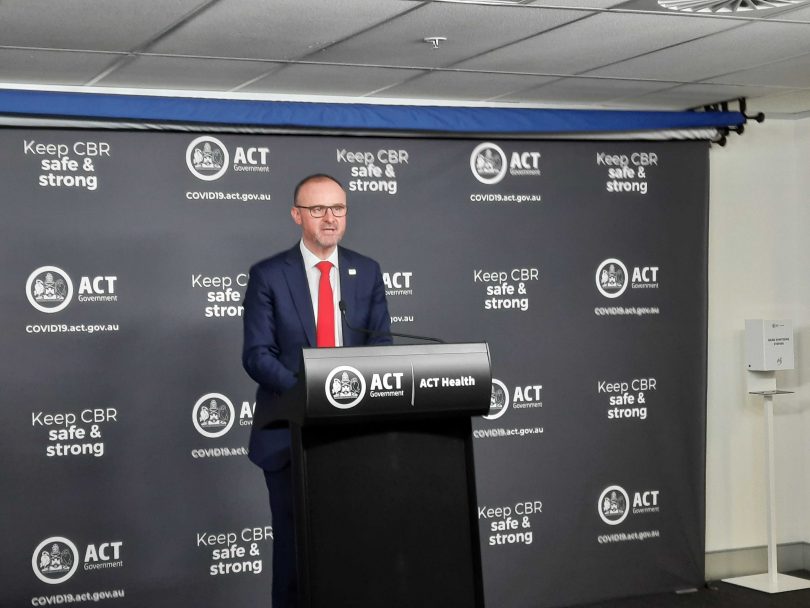
Chief Minister Andrew Barr at today’s COVID-19 briefing. Photo: Ian Bushnell.
UPDATED 12:30 pm: There are 15 news cases of COVID-19 in the ACT, 11 of which are linked. And while five were in quarantine for their infectious period, at least eight were in the community for part of their infectious period.
Nine people are in hospital and one is in ICU and being ventilated.
Deputy Chief Health Officer Dr Vanessa Johnston said at today’s COVID briefing that there are some people who have been knowingly infectious in the community. The preference was for a supportive and educative approach, although police would step in when necessary to enforce public health directions.
Some people who have been infectious in the community have made a quick supermarket trip, while others have been at essential work sites, often for long shifts or over several days. Dr Johnston said there are others who struggle with quarantine for a variety of reasons, including mental health and substance abuse issues.
Chief Minister Andrew Barr conceded that the COVID numbers were “stubborn”, but insisted that the outbreak was being contained.
“You could mount an argument that we are maintaining; we’re not seeing exponential growth,” he said. “The measures are effective in that we’re not seeing a spiralling of case numbers.”
Mr Barr said that vaccination, in addition to public health measures, was beginning to have a marked impact on the spread of the Delta variant. The ACT had not seen exponential growth at any point as the effective reproduction rate (ERR) remained just above or below one.
But the Chief Minister said he was “absolutely certain” that if the lockdown ended now, there would be “an outrageous exponential increase that would rip through the unvaccinated in our community”.
Large households often accounted for the variation in daily headline numbers.
“The days when it’s lower, they are two or three people households. On the days when it’s higher there are multiple people in larger households,” Mr Barr said.
“We are not seeing clusters of 50 to 60 that we saw earlier on associated with schools or nightclubs. We didn’t go through the pattern of one case, four cases, 16, 32, 64 etc … because public health measures kicked in and have suppressed the spread.”
Testing numbers yesterday were just above 2500.
On the vaccination front, 75 per cent of the ACT’s 12-plus population have now had their first dose of vaccine and 51.5 per cent of the 12-plus population are fully vaccinated.
In aged care, 97 per cent of staff have now had at least their first dose ahead of mandatory vaccination requirements taking effect this week.
There are now 241 active cases of a total 556 in the outbreak, and 320 active exposure locations. There are no new public sites of transmission although one new case has been linked to Bidfood at Fyshwick, and two new cases to the Busy Bees childcare centres. All three are household contacts.
Mr Barr said the ACT Government has been working with Federal Treasurer Josh Frydenburg to expand COVID business grants including a further $10,000 for all employing businesses and $3750 for non-employing businesses. There are additional top-up payments for larger businesses with a higher turnover.
Mr Barr said there was also recognition that tourism accommodation, arts, events and hospitality have been hit hard, not only by the current restrictions but also prior border closures and lack of interstate traffic. A further one-off grant is available in those sectors.
A major community support package is ensuring those in need continue to receive support and in many cases receive significant increases. Mr Barr said community sector indexation would be applied to annual funding, assisting organisations to meet higher costs following the recent Fair Work Commission decision on award wages.
There would be assistance for Legal Aid to strengthen their capacity to support and assist vulnerable people and more frontline support for victims of family violence, the elderly, the refugee and humanitarian sectors, applying to everyone who has an ACT Service card.
Emergency food relief, mental health and crisis support and rebates on utility bills for vulnerable households would also be provided.
“This is a stressful time for everyone … please reach out for help if you need it,” Mr Barr said.
11:55 am: The ACT has recorded 15 new cases of COVID-19 to 8:00 pm last night.
Thirteen cases were reported by the ACT yesterday.
Of the 15 new cases, 11 are linked and the remaining are under investigation.
Five were in quarantine for the entirety of their infectious period, at least eight spent part of the time in the community and the rest are under investigation.
Nine people are in hospital and one is in intensive care requiring ventilation.
Testing was down to a little over 2500 yesterday. Chief Minister Andrew Barr urged anyone with symptoms or who has visited an exposure site to come forward for testing.
Yesterday the ACT hit a vaccine milestone: 75 per cent of people over the age of 12 have received a first dose, and 51 per cent aged 12-plus have been double vaccinated.
Just over 97 per cent of staff in residential aged care have had at least one dose ahead of the mandatory vaccine requirement.
In NSW, 1351 new COVID cases and 12 deaths have been announced. There are currently 1,231 cases in hospital, 231 people are in ICU including 108 on ventilators.
Yesterday, NSW recorded 1259 new cases and 12 deaths.
Victoria recorded 514 new cases in the 24 hours to midnight last night.
Yesterday, Victoria recorded 423 new COVID cases and two deaths
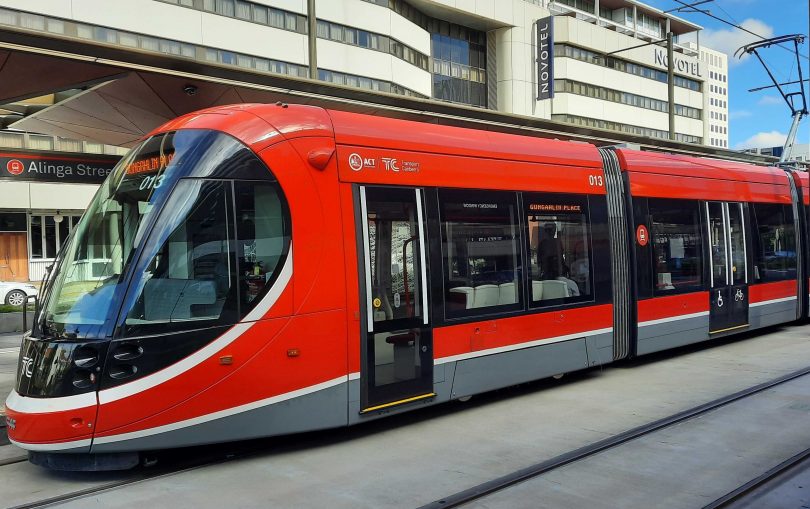
Several light rail journeys are named in the exposure list this morning. Photo: File.
10:15 am: The northern suburbs and a range of public transport routes dominate the list of exposure sites in this morning’s list from ACT Health.
The ACT is now five weeks into its lockdown, with 541 cases of COVID-19 detected since the outbreak began and 243 cases still active.
This week the lockdown was extended for four weeks to 15 October, but there will be a midpoint review of the situation.
Casual contact sites include ALDI Gungahlin, Liquorland Canberra Centre, Grill’d Belconnen, Coles Canberra Centre and Coles Express Belconnen.
Monitor for symptom sites include Coles Amaroo, Pacifik Halal Meats, 7-Eleven Kippax, Woolworths Charnwood and Dunlop, and Coles Amaroo.
The Law Courts were also listed as a casual exposure site. Areas affected include the ground floor foyer, Bail Office, Magistrates Court (Level 1 Foyer outside rooms 1 and 2 only) and Magistrates Court (Room 2 only) from 2:10 pm to 4:10 pm.
A range of bus routes are listed from Thursday through to Tuesday as casual contact sites.
These include Routes 50, 51, 53 and 9 in the inner north; and 28, 31, 32, 53, 8, 19, 20, 3 and 45 involving trips between Gungahlin and Belconnen, the city and Belconnen and Gungahlin and Casey Market Place, Gungahlin and Bonner, the city and Belconnen Interchange, and Belconnen Interchange to Hawker.
Southside routes include Routes 10, 5, 6, 63 and 7, all from Saturday covering trips between Woden and City West, Woden and Denman Prospect, Woden and Cooleman Court, and City West and Lanyon Marketplace.
Three light rail journeys from Monday are listed – between the city and Dickson – and two on Friday between Gungahlin and the city.
Check the full list of locations and times on the COVID-19 website.
Nearly 54 per cent of Canberrans aged 16 and older are now fully vaccinated, with the Moderna vaccine soon to arrive in pharmacies.
Health Minister Rachel Stephen-Smith told the ABC that the ACT would receive its share of the million doses on a per capita basis, with the Territory having about 1.6 per cent of Australia’s total population.












